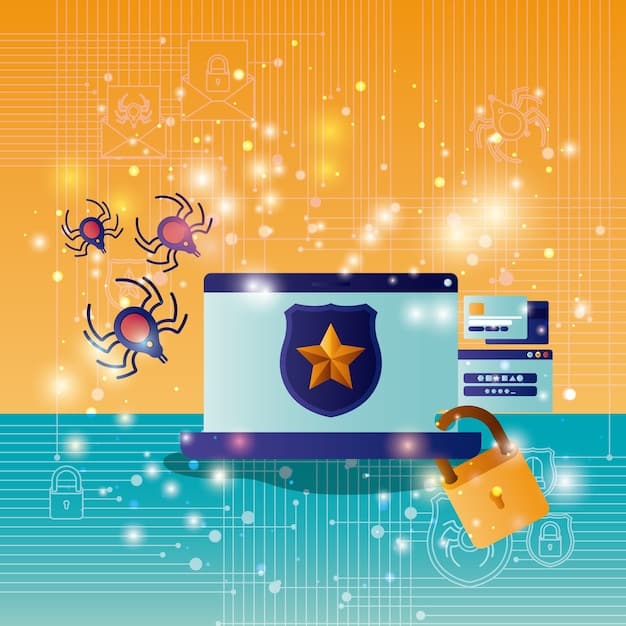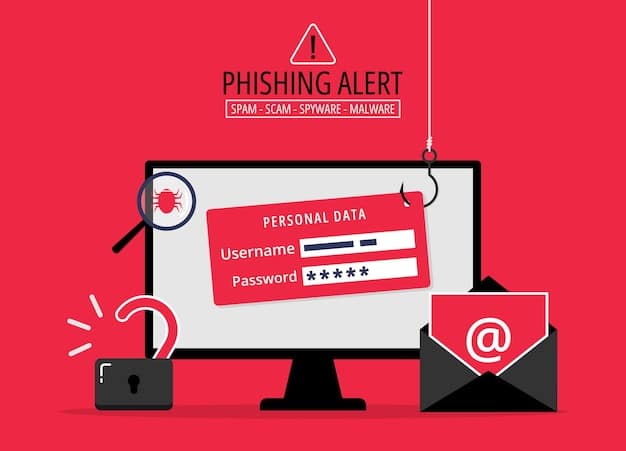National Bank Cybersecurity Breach: Protect Your Accounts Now

A major cybersecurity breach has been detected at National Bank, potentially compromising customer account security; immediate action is crucial to protect your financial information.
A critical alert: major cybersecurity breach at National Bank – steps to protect your accounts now is essential for all customers. This breaking news requires immediate attention to safeguard your financial data from potential theft and misuse.
Urgent Security Alert: National Bank Under Cyberattack
National Bank is currently grappling with a significant cybersecurity incident that poses a direct threat to its customers. The breach, detected late last night, has potentially exposed sensitive customer data, including account numbers, personal identification information, and transaction histories. The bank’s IT security team is working around the clock to contain the attack and assess the full extent of the damage, but immediate action from customers is vital.
This isn’t just about the bank—it’s about protecting your individual financial wellbeing. Cyberattacks are becoming increasingly sophisticated, and even institutions with robust security measures can fall victim. This situation underscores the importance of proactive measures on your part to minimize the risk to your accounts and personal data.

Confirming the Breach: What We Know So Far
The details of the breach are still emerging, but here’s what has been officially confirmed by National Bank and cybersecurity experts investigating the incident.
Key Facts Confirmed
- Compromised Data: Account numbers, names, addresses, social security numbers, and transaction histories may have been compromised.
- Detection Timestamp: The breach was detected late last night.
- Investigation Status: National Bank’s IT security team is actively investigating with external cybersecurity experts.
- Notification Timeline: Affected customers are being notified via email and phone.
The bank has stated that it is working closely with law enforcement agencies to track down the perpetrators and bring them to justice. However, the immediate priority is to secure customer accounts and prevent further unauthorized access.
This situation is evolving rapidly, and new details will likely emerge in the coming hours and days. Staying informed is key to taking appropriate steps to protect yourself. National Bank has set up a dedicated hotline and website for customers to get updates and assistance.
Immediate Actions to Safeguard Your National Bank Accounts
Given the potential severity of this cybersecurity breach, it is crucial to take the following immediate steps to protect your National Bank accounts.
Steps to Secure Your Accounts Now
- Change Your Password: Immediately change your National Bank account password. Use a strong, unique password that you don’t use for any other accounts.
- Monitor Your Account Activity: Closely monitor your account transactions for any unauthorized activity. Report any suspicious transactions to the bank immediately.
- Enable Two-Factor Authentication (2FA): If you haven’t already, enable 2FA on your National Bank account. This adds an extra layer of security by requiring a second verification method, such as a code sent to your phone.
- Contact National Bank: Contact National Bank’s customer service hotline or visit their website for assistance and updates on the breach.
These actions are essential to minimizing the risk of unauthorized access and financial loss. Remember, prompt action is your best defense in a cybersecurity crisis.
Recognizing and Reporting Phishing Attempts
In the wake of a cybersecurity breach, phishing attempts often increase as cybercriminals try to exploit the situation. Be extra vigilant for any suspicious emails, messages, or phone calls that claim to be from National Bank or other financial institutions.
Identifying Phishing
Phishing attempts often exhibit the following characteristics:
- Generic Greetings: Emails that start with “Dear Customer” instead of your name.
- Urgent Requests: Demands for immediate action or threats of account closure.
- Suspicious Links: Links that lead to unfamiliar or misspelled websites.
- Requests for Personal Information: Asking for your username, password, social security number, or other sensitive information.
If you receive a suspicious communication, do not click on any links or provide any personal information. Instead, contact National Bank directly using the official contact information on their website.

Strengthening Your Overall Cybersecurity Posture
While addressing the immediate threat from the National Bank breach is crucial, it’s also a good opportunity to review and strengthen your overall cybersecurity posture.
Enhancing Your Security
Consider the following best practices to improve your overall cybersecurity:
- Use Strong, Unique Passwords: Use a different, complex password for each of your online accounts. A password manager can help you generate and store strong passwords securely.
- Keep Your Software Updated: Install software updates promptly to patch security vulnerabilities.
- Use a Reputable Antivirus Software: Use a reputable antivirus software and keep it up to date.
- Be Cautious Online: Be cautious about the websites you visit and the links you click on. Avoid downloading software from untrusted sources.
By implementing these measures, you can significantly reduce your risk of falling victim to cyberattacks and data breaches. Cybersecurity is an ongoing process, not a one-time fix.
Long-Term Implications and Future Security Measures
The National Bank cybersecurity breach highlights the growing threat of cybercrime and the need for robust security measures across all industries. Banks and other financial institutions will likely face increased scrutiny and regulatory pressure to enhance their cybersecurity defenses.
Looking Ahead
The breach may lead to the following changes:
- Increased Investment in Cybersecurity: Banks will likely increase their investment in cybersecurity technologies and personnel.
- Stricter Regulations: Regulators may impose stricter cybersecurity requirements on financial institutions.
- Enhanced Customer Education: Banks will likely increase their efforts to educate customers about cybersecurity threats and best practices.
Ultimately, the cybersecurity breach at National Bank serves as a wake-up call for individuals and organizations alike. It underscores the importance of staying informed, taking proactive steps to protect your data, and working together to combat cybercrime.
| Key Point | Brief Description |
|---|---|
| 🚨 Breach Alert | National Bank confirms a major cybersecurity breach. |
| 🔑 Immediate Action | Change your password, monitor accounts, and enable 2FA. |
| 🛡️ Cybersecurity Tips | Use strong passwords and keep software updated. |
| 🎣 Avoid Phishing | Be cautious of suspicious emails and requests for information. |
Frequently Asked Questions
▼
Potentially compromised data includes account numbers, names, addresses, social security numbers, and transaction histories. The bank is still assessing the full scope.
▼
2FA adds a second layer of security, like a code sent to your phone, alongside your password. This makes it harder for unauthorized users to access your account, even if they know your password.
▼
Look for generic greetings, urgent requests, suspicious links, and requests for personal information. Always contact the bank directly to verify any communication.
▼
Contact National Bank’s customer service immediately to report the suspicious activity. Change your password and monitor your account closely for further unauthorized transactions.
▼
National Bank is investigating the breach with cybersecurity experts, notifying affected customers, and working with law enforcement to identify the perpetrators and prevent future incidents.
Conclusion
The cybersecurity breach at National Bank serves as a stark reminder of the ever-present threats in the digital age. By taking immediate action to protect your accounts and strengthening your overall cybersecurity posture, you can minimize your risk and safeguard your financial future. Stay vigilant, stay informed, and prioritize your security at all times.





